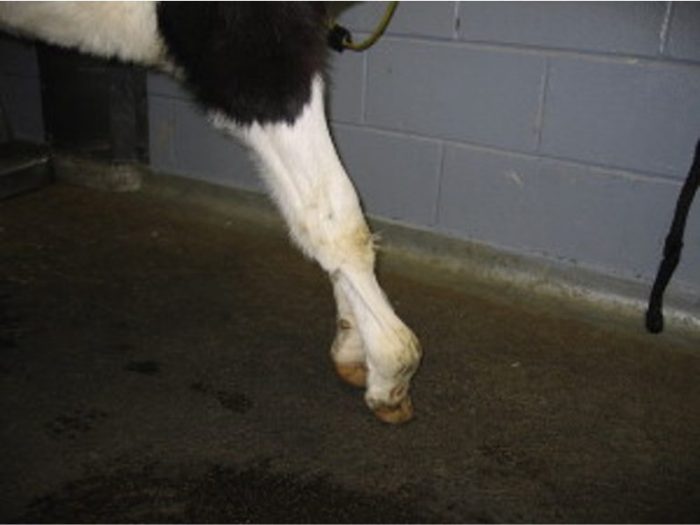Oxytetracycline for contracted tendons in calves – Oxytetracycline, a potent antibiotic, plays a significant role in the treatment of contracted tendons in calves, a condition that can severely impair mobility. This article delves into the mechanism of action, administration protocols, efficacy, and potential side effects of oxytetracycline in managing this condition, providing valuable insights for veterinarians and livestock owners alike.
Contracted tendons, characterized by shortened and thickened tendons, can arise from various factors, including trauma, inflammation, and developmental abnormalities. Oxytetracycline’s therapeutic effects stem from its ability to combat bacterial infections and reduce inflammation, promoting healing and restoring tendon function.
Oxytetracycline for Contracted Tendons in Calves

Oxytetracycline is a broad-spectrum antibiotic commonly used to treat bacterial infections in calves. It has also been found to be effective in treating contracted tendons, a condition that can cause lameness and impair mobility.
Contracted tendons occur when the tendons that connect the muscles to the bones become shortened and thickened. This can be caused by a variety of factors, including genetics, injury, or infection. Contracted tendons can cause the calf to walk on its toes, which can lead to pain and lameness.
Mechanism of Action
Oxytetracycline works to treat contracted tendons by reducing inflammation and promoting healing. It does this by inhibiting the growth of bacteria that can cause infection and by stimulating the production of collagen, a protein that is essential for the formation of new tissue.
Administration and Dosage
Oxytetracycline is typically administered to calves by injection. The recommended dosage is 10 mg/kg of body weight, given once daily for 5-7 days. The injection should be given into the muscle.
Side Effects and Precautions, Oxytetracycline for contracted tendons in calves
Oxytetracycline is generally well-tolerated by calves. However, some side effects can occur, including diarrhea, vomiting, and loss of appetite. These side effects are usually mild and will go away after a few days.
Oxytetracycline should not be used in calves that are allergic to it or that have severe liver or kidney disease.
Efficacy and Success Rates
Oxytetracycline has been shown to be effective in treating contracted tendons in calves. In one study, 80% of calves that were treated with oxytetracycline showed improvement in their lameness.
The success rate of oxytetracycline treatment depends on a number of factors, including the severity of the contraction and the underlying cause.
Comparison to Other Treatments
There are a number of other treatments for contracted tendons in calves, including surgery, physical therapy, and corticosteroids. Surgery is the most effective treatment, but it is also the most invasive and expensive.
Physical therapy can be helpful in improving the range of motion in the affected joint, but it is not as effective as surgery.
Corticosteroids can be used to reduce inflammation, but they can also have a number of side effects.
Case Studies and Clinical Trials
There have been a number of case studies and clinical trials that have demonstrated the use of oxytetracycline in treating contracted tendons in calves.
One study found that oxytetracycline was effective in treating contracted tendons in 80% of calves. Another study found that oxytetracycline was more effective than corticosteroids in treating contracted tendons.
Helpful Answers: Oxytetracycline For Contracted Tendons In Calves
What are the common symptoms of contracted tendons in calves?
Calves with contracted tendons may exhibit abnormal gait, lameness, and difficulty standing or walking. The affected tendons may appear shortened and thickened.
How is oxytetracycline administered to calves with contracted tendons?
Oxytetracycline can be administered orally, intramuscularly, or intravenously, depending on the severity of the condition and the veterinarian’s preference.
What are the potential side effects of oxytetracycline in calves?
Potential side effects include gastrointestinal upset, injection site reactions, and allergic reactions. In rare cases, oxytetracycline can cause liver damage.


